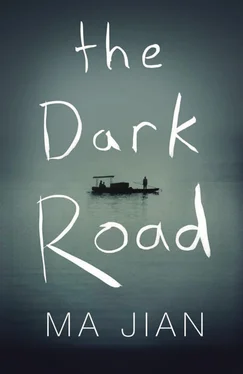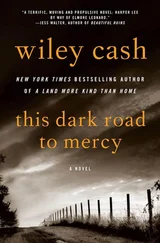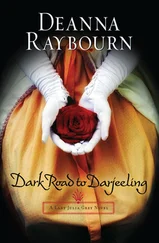Instead, she serves Nannan some deep-fried squid and says, ‘When I get to the office tomorrow, I’d like to go through last year’s accounts and cross off all the bad creditors from our client list. What do you think?’
‘Let’s not talk about tomorrow. So, tell me, how did you see in the new year?’
‘We just ate dumplings and watched the televised gala. Spring Festival was so much more fun when I was a child. At the crack of dawn, we’d walk round the village visiting our neighbours and they’d fill our pockets with boiled sweets.’ She remembers tying a brand-new scarf around her head before setting off one new year’s morning. The inky smell of the stiff cotton swirled around her all day.
‘Have you taken any festive photographs with the digital camera I gave you for Christmas?’ Tang asks.
‘Not yet. I want the first photograph I take with it to be of little Heaven.’ Meili notices Nannan drawing faces on her fingers with a ballpoint pen, and nudges her to stop.
‘The camera will be out of date by then! Now we’ve entered the digital age, electronic products will become obsolete within months. Everyone wants to upgrade to larger screens, bigger hard drives, more memory, so e-waste is growing at an alarming rate. Did you know that Heaven received five times more e-waste this year than it did in the last three?’ Seeing Meili’s eyes begin to glaze over, he draws a red envelope from his pocket and hands it to Nannan. ‘This is my New Year gift to you,’ he says. ‘There’s some Lucky Money inside!’
Nannan opens the envelope. ‘Wow! A hundred yuan! Cool! Lulu’s mother only gave me one yuan. Thank you, Uncle Tang. Can I buy a plane ticket with it?’
Meili is embarrassed that she’s only put ten yuan in the red envelope for little Hong, so she excuses herself, sneaks off to the toilet and replaces it with a hundred-yuan note.
As Tang answers his phone on their way out of the restaurant, Meili takes the opportunity to say a brief goodbye, then hails a tricycle rickshaw which agrees to take them to Foshan for forty yuan. ‘What’s the point of going to see the Golden Flower Mother statue?’ Nannan says grumpily. ‘You think she can phone your baby and tell it to come out?’ Some of the faces on her fingers are crying, some are laughing.
‘Oh, shut up, and stop grumbling.’ During the last few months, Meili has tried to be tolerant of Nannan’s bad moods, but occasionally her patience snaps.
‘Mum, can you put a red spot here between my eyebrows,’ Nannan says as they approach the centre of Foshan half an hour later. ‘It’s called a “Lucky Dot”. I read it can protect you from demons.’
‘Wait a second, we’re here now. Let’s get off!’ Meili takes out her lipstick as she climbs off the rickshaw, but just as she’s about to dab some between Nannan’s eyebrows, a large crowd pushes them forward, so she quickly drops the lipstick back into her bag.
They pass a line of food stalls with greasy mutton skewers smoking on charcoal braziers and semi-raw pigs’ trotters simmering in woks, then enter the large temple and are hit by clouds of incense smoke. Meili sits down, and nearly retches from the oily stench and feels Heaven’s stomach turn as well.
‘Mum, is it true that Heaven won’t come out unless I disappear?’ Nannan asks, as Meili rises to her feet.
‘No, no, what made you think that?’ she answers, looking distractedly at the visitors jostling past.
‘You said you’re afraid of giving birth to Heaven because you’ve already got me.’
‘No, it has nothing to do with you,’ Meili replies, taking Nannan’s hand and following the crowd into the main hall. When they reach the Golden Buddha, Meili prostrates before it like everyone else, but forgets what she should be praying for. On her left, she hears a young man pray for success in his university entrance exams, and on her right a taxi driver pray for a prolonged rainy season that will bring him more customers. Her mind clearing at last, she clasps her hands together, looks up at the Buddha and prays that her mother’s cancer will be cured, that her brother will be released safely from the labour camp, and that Waterborn is not begging on a street corner but is being looked after by a nice family who give her good meals three times a day… The loud murmur of voices around her makes her lose her train of thought. She gets up, takes Nannan’s hand and goes to look for the statue of the Golden Flower Mother.
‘I don’t want to see the statue,’ Nannan moans. ‘It’s too crowded in here.’
‘Wait for me over there, then,’ Meili says, ‘and don’t go wandering off this time.’ As Nannan heads to the entrance, Meili proceeds to the less crowded area at the back where the huge Golden Flower Mother statue stands. She lights an incense stick, goes down onto her knees, and performs repeated prostrations, turning to the side when she reaches the ground so as not to squash her belly. Then she sits down with legs crossed, takes a deep breath, and looks up at the Golden Flower Mother’s scratched and childlike face. For a moment, she thinks she sees the painted mouth curl into a smile. Then she blacks out and sees a young girl walking down a dusty path on a sunny day, a hemp sack of autumn leaves swung over her shoulder. She can hear the girl laugh, but can’t see her mouth moving. The girl has just crossed a dense forest, and her face is as scratched as the rosy cheeks of the Golden Flower Mother statue… Suddenly the stump of Meili’s left index finger begins to throb like a sightless eye searching for light. Little Heaven stretches out and rams its head into Meili’s lungs, then turns in a circle and punches her navel. After taking a few minutes to compose her thoughts, Meili addresses the statue, saying, ‘Golden Flower Mother, your powerful eyes have seen the Five Lakes and Four Seas. I am a simple woman from Nuwa County, and am pregnant for the fourth time. Although the government doesn’t want my child to be born, and my child doesn’t want to be born either, as her mother, I think I should give birth to her, for a mother must not only conceive children, but also release them into the world and watch them grow. So I entreat you, Golden Flower Mother, tell me how this will end? What does the future hold for me? Good fortune or calamity?’
The Golden Flower Mother statue looks down impassively and says: ‘Praise be to Amitabha, Buddha of Infinite Light. Life is a sea of suffering — but turn your head and there is the shore. In time, you will cross the sea, transcend the cycle of birth and death, and reach the other side. But before then, you must deliver the child within you and allow it to accumulate its own karma.’
‘Oh, Mother, I am an outcast. Wherever I go, people tell me this isn’t my home. If I give birth to my child in a place where I don’t belong, will she be destined to a life of misfortune?’
‘You have journeyed through the red dust of illusion, and through suffering have achieved profound wisdom. But your sorrows cannot compare to mine: I have never known the happiness of marriage, the joy of motherhood. At fourteen years old I was snatched from my parents and declared the Goddess of Childbirth. After that, no man dared come near me. At the age of forty, still alone and unloved, I threw myself into Womb Lake and drowned. My bones are still lying on its muddy bed.’
‘I never knew you drowned yourself! So you really have seen through the red dust! I thought about killing myself too, a few years ago, but realised that if I went ahead with it, I’d be killing my unborn child as well. But, Sacred Mother, things aren’t so bad for you, surely? You must have amassed great karma through your work in this temple, helping bring new life into the world. And look at all the delicious offerings you’ve been given: chicken, wine, sesame oil, rice—’
Читать дальше












